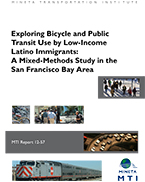- 408-924-7560
- mineta-institute@sjsu.edu
- Donate
Exploring Bicycle and Public Transit Use by Low-Income Latino Immigrants: A Mixed-Methods Study in the San Francisco Bay Area
Latin American immigrants will continue to make up a large share of transit ridership, bicycling and walking in the United States for the foreseeable future, but there is relatively little research about them. This mixed-methods study compares the travel patterns of low-income immigrants living in the San Francisco Bay Area with that of other groups and investigates the barriers and constraints faced by low-income immigrants when taking transit and bicycling. Much of the previous work on immigrant travel has relied on national surveys and qualitative analysis, which underrepresent disadvantaged population groups and slower modes of travel, or are unable to speak to broader patterns in the population. We conducted interviews with 14 low-income immigrants and a paper-based intercept survey of 2,078 adults. Interviewees revealed five major barriers that made public transit use difficult for them, including safety, transit fare affordability, discrimination, system legibility, and reliability. Although crime was the most prominent issue in interviews, the survey results suggest transit cost is the most pressing concern for low-income immigrants. Low-income immigrants were less likely than those with higher-incomes to have access to a motor vehicle, and were less likely than higher-income immigrants or the U.S.-born of any income to have access to a bicycle or bus pass. Finally, although most barriers to public transit use were the same regardless of nativity or household income, low-income immigrants were much less willing to take public transit when they had the option to drive and less willing to bicycle for any purpose. The prevalence of concerns about transit affordability, crime, and reliability suggest transit agencies should consider income-based fare reductions, coordinated crime prevention with local law enforcement, and improved scheduling.
JESUS BARAJAS, MURP
Jesus M. Barajas is a PhD candidate at the University of California, Berkeley. His research focuses on questions of transportation equity, travel behavior, and active transportation. He holds a bachelor’s degree in computer science from Penn State University and a master’s degree in urban and regional planning from California State Polytechnic University, Pomona.
DANIEL G. CHATMAN, PhD
Dan Chatman is an Associate Professor at the University of California, Berkeley, appointed in the Department of City and Regional Planning. He conducts research on travel behavior and the built environment; residential and workplace location choice; and the connections among public transportation, immigration, and the economic growth of cities. His ongoing research projects include studies addressing the economic costs and benefits of smart-growth strategies; the effects of TOD-caused displacement on auto use; and the relationship of transit investments to firm births and agglomeration economies in U.S. cities.
ASHA WEINSTEIN AGRAWAL, PhD
Asha Weinstein Agrawal is Director of the MTI National Transportation Finance Center and also Professor in the Department of Urban and Regional Planning, both at San José State University. Her research agenda is guided by a commitment to the principles of sustainability and equity; she explores the planning and policy tools that communities can adopt to encourage environmentallyfriendly travel and improve accessibility for people struggling with poverty or other disadvantages. She has explored these issues most deeply through two substantive areas, transportation finance policy and the travel behavior of pedestrians, cyclists, and transit riders. Dr. Agrawal has a BA from Harvard University, an MURP from the London School of Economics and Political Science, and a PhD from the University of California at Berkeley.
-
Contact Us
San José State University One Washington Square, San Jose, CA 95192 Phone: 408-924-7560 Email: mineta-institute@sjsu.edu






